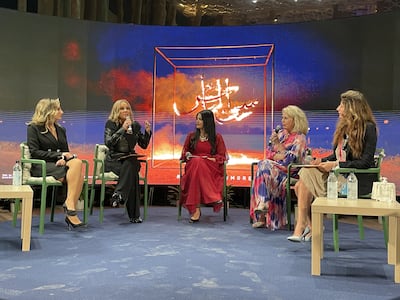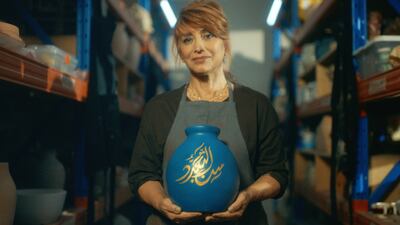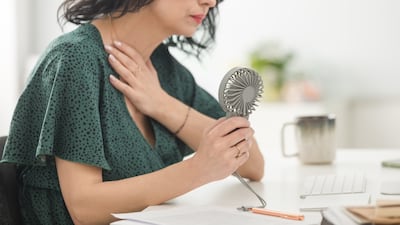In 2021, Tena Middle East created a groundbreaking ad campaign around menopause that went viral faster than a fiery hot flush, fuelling a nascent movement in the region.
After surveying women in Saudi Arabia on their feelings around a particularly depressing Arabic term for menopause, which translated to “age of despair”, the incontinence brand found 81 per cent believed it should be changed. Their resulting two-minute video featured Arabic singer-songwriter Ghalia singing a song titled Despair No More, offering a series of upbeat and more hopeful replacements – renewal, reflection, courage, wisdom, movement, creativity – to describe what women going through menopause in the region are experiencing.
“Age of renewal” was later added to Almaany, the Arabic dictionary.
'People are now aware'

“Words matter,” said Sarah Berro, associate creative director at Impact BBDO, the agency behind the advert. “They shape how we see the world and how we see ourselves. By changing the 'age of despair', we’ll end the stigma of menopause for ourselves, our mothers and our daughters.”
That same year, Tena teamed up with the United Nations Population Fund for a panel discussion at Expo 2020 called Breaking Stigmas Around Women Ageing, featuring TV presenter Rania Ali and Egyptian actress Shereen Reda. In June last year, Abu Dhabi Health Services (Seha) opened the first clinic in the emirate dedicated to helping women going through menopause. And in February, StratHealth Pharma, maker of MoreSense, a new intimate gel for women, quietly broke additional ground by sponsoring an event focused on women’s sexual wellness and health at the American Academy of Cosmetic Surgery Hospital in Dubai.
founder, Middle East Menopause Organisation
While hot flushes get much of the attention in menopause, Dr Manal Ibrahim Sabbar, head of obstetrics & gynaecology at Gargash Hospital in Dubai, told those gathered that doctors see women experiencing a range of “private” problems too, including vaginal dryness and loss of sensation and libido – all things that can be dealt with if women can get over their fear of telling their doctor about it.
This year there are a range of menopause-related events scheduled throughout October, which is Menopause Awareness Month. The subject was addressed on Wednesday and Thursday at the Crunchmoms Summit during the Unspoken Truths of Women’s Wellbeing circle. On Monday, the University of Birmingham Dubai will tackle the subject of Menopause at Work, and on October 25, TishTash Marketing and Public Relations and Hotflash Inc will co-host All the Meno Ladies, a drop-in event from 6pm-9pm at August in Address Fountain View Hotel.
Dr Fiona Rennie, a family medicine consultant at Genesis Healthcare Centre in Dubai, who will be speaking at the event, began specialising in this transition after travelling to the UK to seek treatment for her own menopause issues several years ago. Britain has been the scene of a literal #menopauserevolution, one that has resulted in a major increase in awareness and media coverage, with menopause being discussed in parliament and included in the high school curriculum and, most importantly, lead to a range of improvements in care.
The power of the British campaign and the corresponding boost in social media posting has definitely had an impact regionally, says Dr Rennie.
“People are now aware of it,” she says. “There's a lot more talk, it's not taboo any more. I'm really happy when someone comes to me and doesn't have any or many symptoms and asks me what to expect.”
Donna Howarth, a 3rd Age Women coach and founder of Middle East Menopause Organisation, has witnessed the shift first-hand.
“When I look at the UAE, there’s so much change that has occurred over the past nearly three years since I created Memo, when we literally had nothing,” says Howarth.

The old mindsets about menopause hormone therapy – fear stemming from flawed findings released as part of the 2002 Women’s Health Initiative study in the US – are falling away, she adds, and there are a range of options available now, including bio-identical patches and gel, and even testosterone.
However the awareness that is spreading out slowly across the Gulf is almost non-existent in Saudi Arabia, says Howarth. “I’ve had women reach out to me on Instagram sharing the utter despair that they are in the workplace, but not able to function,” she said. “They are taking so much time off.”
'It's very individual'
Menopause simply signals the end of a woman’s fertility, marked by 12 months without periods at an average age of 51, but much less is known about the lead-up phase known as perimenopause. The earliest stages can impact mood and sleep, and women can still be fertile and bear children even as they begin having symptoms up to a decade or more before.
Obstetrics & Gynecology specialist, HealthPlus Family Health Centre
This means some start to notice changes as early as their mid to late-30s, when menopause is the farthest thing from their mind. Complicating matters, most doctors – even obstetrician-gynecologists – spend little or no time on the subject in medical school.
It’s important to understand this is a natural process and while there can be changes, there’s nothing to fear, explains Dr Neha Gami, a specialist in Obstetrics & Gynecology at the HealthPlus Family Health Centre in Abu Dhabi.
“It’s very individual, and not everyone goes through it the same way,” she says. “It also depends where you are in your life. If you're going through a chilled stage, it might not affect you as much, but if you are going through a stressful stage, it might more.”

Dr Gami, who is one of the rare local physicians with specialist training in the subject from The Menopause Society of North America, has also noticed a big shift in awareness in the region, in the form of an increase in proactive questions and just general curiosity from younger women – including Emirati patients.
That has not been reflected in the findings of Dr Linda Smail, who has been researching the knowledge and attitudes of Emirati women towards menopause, menopause hormone therapy and quality of life in menopause since 2017.
The associate professor at Zayed University’s College of Interdisciplinary Studies, specialising in applied statistics, obtained UAE government funding to conduct a range of revelatory in-person interviews. “You know, they don’t even like to talk about it,” she said. “It’s like a disease they want to avoid, and they are shy.”
Many women don’t talk to their husbands about what they are going through, either. One heartbreaking revelation of her research aligns with what Howarth is hearing from Saudi, and what is reflected in the US and UK, too – many women end up quitting their jobs. Dr Smail heard from women who said: “We didn’t have that support in work. So we stopped because we couldn’t handle it.”
'Let's change the landscape'
She believes, however, that there is a clear path forward for government and industry to help support women better on the job, at home and in general society.
Getting menopause education into the high school curriculum so women and men can learn about it early, as it is in the UK, would be key, as would government funding devoted specifically to providing menopause support by name, she believes.
Another suggestion is having accredited, regional menopause training available in English and Arabic for physicians who want it. Dr Smail is also translating a questionnaire adapted from Europe into Arabic, to formally assess the level of knowledge and attitudes, and she would like to see it adopted and put into wide circulation.
One stumbling block on the medical side continues to be access to a reliable supply of menopause hormone therapy, which combined with lifestyle modifications can be a game-changer for helping women deal with their symptoms, says Dr Rennie.
Supply chain issues found in other parts of the world have an impact here too, and while the big hospitals and clinics can import their own medication, many doctors and clinics – and their patients – must rely on external distributors.
In the meantime, despite all the progress and hope for the future, finding care is still challenging, women continue to suffer silently, and stigma and shame remain. That’s what keeps Howarth focused on her guiding rallying cry: “Let’s change the landscape of menopause in the Middle East, and ensure that every woman has access to the support and care she needs.”
Ann Marie McQueen is the founder of Hotflash inc, a global platform providing evidence, expert and experience-based information and inspiration for women going through perimenopause

